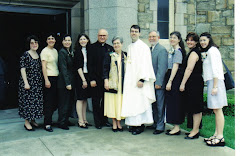Knowing I have to preach on a given Sunday, I find it very useful to take my time in allowing ideas to come to mind. Going over the readings early in the week and allowing them to float in my mind for a few days helps me to to focus on what events of the week connect to the readings.
As the week continues, I return to the readings with greater focus and attention. Using various homily helps and biblical commentaries give depth to the readings while I allow my own mind to delve into my own experiences to relate personally to the passages.
Some weeks the message of the readings is crystal clear, other times not so much. yet, as it is the Word of God, no matter what, there is a truth to be uncovered if we are willing to work and open our eyes.
Thursday, September 17, 2009
Wednesday, September 16, 2009
Who Do You Say That I Am?
This sunday's gospel asked a truly central question to our lives of faith. Who do we say that Jesus is? Peter's response was correct; Jesus is the Christ. Unfortunately, Peter knew the right answer, but didn't understand what that answer truly meant. As a former English teacher, there have been many times when students would give the correct answer or use the right word in a sentence, but when asked to explain that answer or to define the word, they find that they cannot.
Each of Christ's followers had a different idea of what being The Christ meant, but they were thinking as humans do, not as God does. God redefined Messiah.
So, who is Christ for each of us? Jesus wants us to be able to not only give the right answer but to explain that answer in how we live - hence the second reading from James.
Each of Christ's followers had a different idea of what being The Christ meant, but they were thinking as humans do, not as God does. God redefined Messiah.
So, who is Christ for each of us? Jesus wants us to be able to not only give the right answer but to explain that answer in how we live - hence the second reading from James.
Subscribe to:
Comments (Atom)
